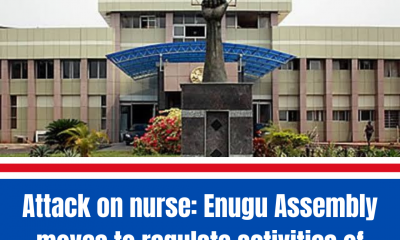Editorial
The psyche of pandemic palliatives

No. The bullets pierced the body ferociously, voraciously, and ate up the flesh in a manner that human canines will gnaw overcooked meat. The bullet is neither a sunray that emits vitamin C or a splash of raindrop that cools of our melanin. No. It is a killer that chases a soul away from the body. When it spares a life, limbs may not be that lucky. It has the temerity to condemn one into perpetual health and psychological imprisonments.
Thus, when some of the endSARS protesters who chose not to renege on their tenacious request to end police brutality in Nigeria fell to the bullets of unknown soldiers on 20th of October, 2020, it was not a surprise. Whoever assumed that bullets were mere sponges to wash the fragile and beautiful bodies of those fledging protesters must have watched Arelu, a popular movie produced by late Chief Jimoh Aliu for too long.
For it is only in such a movie, where the human body would prettily repel life bullets and the viewers would believe such a scene, and be pleased that their darling dramatist survives. It transcends human imagination that some media spin doctors expected the survivors of that massacre to tell the world the number of causalities. Surely, a man who survives a hit and run driver would never flounder to pick a stranded plate number of the car that hit him!
Expectedly, the massacre birthed a furry of anger; it came like a whirlwind winding entire Nigeria into cesspits of humans and materials wreckage. Lagos as the epicentre of the mayhem was totally in shambles as government and private investments perished in billions of Naira worth, and scores of lives were lost. It is a sheer waste of time joining the frays of who killed who, or more poignantly, the denial of the reality of the fatality, or more caustically, the question of who ordered the soldiers, or more quizzically, the truism of whether the killers are soldiers or fake soldiers.
Of major importance to the crux of ripples that were made from Nigeria’s trouble water was the seismic discoveries of palliatives meant for Nigerians. Lagos, Osun, Ekiti, Kaduna, Kwara, Yola, Cross-River, and virtually all the States in Nigeria witnessed rains of manna from heaven. The manner at which palliatives came down from ‘heaven’ would make the Biblical Israelites envious of a new generation of men beating their records even without a Moses in our midst. Warehouses became barns where Nigerians were harvesting their palliatives. There is no impediment strong enough to stop the zealous Nigerian citizens from getting their shares of palliatives from various hideouts where the foods were kept for only God knows reasons. Not the soldiers’ guns, the military presence, physical deformities, gender, or any other hurdle could prevent Nigerians from partaking in this carnival of harvest.
In response to the COVID-19 pandemic which ravaged the world and paralyzed economic activities beyond measure, the Federal Government of Nigeria made a number of good measures to cushion the effects of the lockdown on Nigerians, especially, the most vulnerable individuals in the society. One of such measures was the direct distribution of food items and cash. The Federal Government first target 2.6 million households and later increased the number to 3.6 million households. The Ministry of Humanitarian Affairs, Disaster Management and Social Development headed by Hajiya Sadiya Umar Farouq was saddled with the responsibility of ensuring the distribution of the palliatives. Eyebrows were raised when the target population for the palliatives received insignificant crumbs from these sumptuous palliative cares. In fact, hunger and anger from the lockdown birthed One Million Boyz in Lagos who defied the fear of coronavirus to unleash mayhem on Lagos residents during the pandemic. Some households resorted to begging for food for survival.
However, Hajia Farouq was quoted as “there’s hardly anyone in Nigeria who didn’t receive the Federal Government palliative care during the COVID-19 pandemic period. Hearing some tribes crying, especially the eastern part of Nigeria and the South-South that no palliative care was given to them tends to blackmail. Nobody in the eastern or south-southern parts of Nigeria will say he or she didn’t receive any palliative from the government, especially the Federal Government relief cash transfer sent to their respective bank accounts.” Nigerians took her assertion with pinch of salt as hardly could any lucky household got 10 cups of rice. In most cases, private individuals, communities, associations came to the rescue of Nigerians. It was reported in the media that on April 10, 2020, Lagos State received 6,000 bags of rice and two truckloads of vegetable oil from the Federal Government of Nigeria for distribution to the poor and the vulnerable in the State. The other States got their shares, too. In reality, people could not feel the effects of these palliatives.
Today, there is no mountain too high for Nigerians to climb in their search for palliatives. For the poor and vulnerable who constituted a significant percentage of this palliatives finders, every politician house is a warehouse. They do not limit their harvests to mere food items; they have chosen to drink their palm wine without sparing the vat, and who would blame them? It seems the populations of poor and vulnerable Nigerians have chosen to team up in searching for their palliatives, and more worrisomely, the holders of their palliatives. They are pitifully lost in their mental calculations and imaginations of what constitute palliatives.
One of the ways through which government can quench this wildfire is by yielding to the yearnings of ASUU and get the students back to school. The government may put oil in this troubled water by closing the inequality gap in salaries of government functionaries and other workers, routes palliatives directly to Nigerians through their BVNs, shows more openness and empathy to the citizens, and makes the economy work at all cost. The government must find a solution to assuage this class of people and debrief them from their festering psyche of pandemic palliatives. Government has a golden option of acting fast, at least for once in a lifetime of this administration or risking unprecedented mobocracy.
-

 News5 days ago
News5 days agoAttack on nurse: Enugu Assembly moves to regulate activities of masquerades
-

 News2 days ago
News2 days agoFake Reverend Sister Arrested With 38 Children
-

 Politics6 days ago
Politics6 days agoAPC leader collapses and passes away in church on Friday
-

 News6 days ago
News6 days agoLocal Content, Local Fraud
-

 News6 days ago
News6 days agoCourt awards N10m damages against EFCC for ‘unlawful’ publication against Christ Embassy Pastor Miebi Bribena and wife
-

 Politics7 days ago
Politics7 days agoHon. Dr Gentle Emelah inaugurated as commissioner of education,
-

 Gist16 hours ago
Gist16 hours agoMy Boss Used To ‘KNACK’ My Wife After Sending Me On A Mission, To The Extent She Got… – Ex-soldier
-

 Politics5 days ago
Politics5 days agoMagnus Abe: my rift with Wike over




